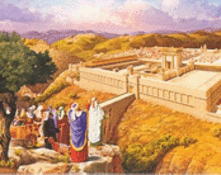Hasten the Day
Chuck Missler of blessed memory noted that in each of the three sets of seven in the book of Revelation (seals, trumpets, and bowls), there was a parenthesis between the sixth and seventh. That may solve a mystery related directly to our own day.
Psalm 90 says a thousand years is like a day in YHWH’s sight. Is that just an idiomatic way to say that time, whether short or long, is all the same to Him? Or that He has existed for so “long” that a millennium is just a blink of the eye to Him? Many have thought so.
But when Kefa/Peter quotes (or paraphrases) this psalm (2 Peter 3:8), he puts it in the context of “YHWH is not slack concerning His promise.” (3:9) What promise? Messiah’s coming (3:4), for already in his day, some were starting to think all history has been the same, and that none of the geological processes in place now have ever changed. This facilitates the theory of evolution and slow sedimentation at the current rate rather than major catastrophes that could have caused rapid changes in earth’s surface, including formation of mountain ranges in a matter of days and grand canyons formed by inundations cutting through newly-formed strata. We could spend hours on this (see the books by Donald Patten for more detail), but Kefa cites just one example—the Noahic flood. The world was a very different place before that; read such ancient Hebrew writings such as the Book of Jasher or Enoch (both quoted in Scripture), or other similar ones no longer included in canons as they once were—Jubilees, the Book of Adam, 4th Ezra, etc.
But Kefa’s point is that it will become a very different place again; the current processes won’t continue forever, but the fact that they have not changed within our memory makes many doubt that they ever will (aside from the type of climate change claimed to be of human origin in recent years).
Still, why does he tie this to Psalm 90?
The answer may lie in an ancient Jewish idea in regard to prophecy that the present world’s history consists of a week of millennia, with the final “sabbath” millennium being the Kingdom. The first and second are called the days of “chaos”—up until Abraham. The third and fourth are called “the days of Torah”. Interestingly enough, the fifth and sixth days are called “the days with Messiah”. That is in reference to the past 2,000 years! That doesn’t line up very well with modern Jewish thought, but it certainly fits well with the fact that Messiah did come just as the fourth days was sliding into the fifth. (This also gives the writer to the Hebrews—in 1:2--the right to call his own time “these latter days”—“latter” being eschatoi, the Greek equivalent to the Hebrew concept of akharit yamim seen in so many of the prophets when they refer to the Kingdom. He was already past the middle of the “week” and in one of the last three days of the “week”.)
So now, if Usher’s chronology is anywhere close to right (and he does base it on the lifespans and dates provided in Scripture itself, so it is pretty consistent and certainly more accurate than the current Jewish estimate, in which Rabbi Eliezer left 210 years out of the Persian period, according to Micha’el Washer), we have just passed the end of the sixth day.
Kefa specifically says that “in the latter days”, many scoffers, being skeptical that Yeshua would never return. Why? Could it be because we passed the 6,000th year and he has not yet come? “See? Nothing has changed and nothing is going to change!”
But what is Kefa’s response? “YHWH is not slack concerning His promise…but is very patient toward us, not willing that any should perish, but that all should come to repentance”. (3:9)
Could the “world week” follow the same pattern of Revelation, where the “stopwatch” is stopped for a short while between the sixth and seventh “days” to allow all the threads that have been begun to finish coming into place so all can be ready for the Kingdom—and most importantly, that the Kingdom’s CITIZENS can be gathered and ready to be a people fit to populate it?
Kefa seems to be saying so, because he tells us, “Since [the present earth] is to be dissolved, what kind of people should we be…looking for and hastening the coming of the Day of YHWH…” (3:11-12)
What? We can make it come more quickly? I thought the Father had “set times and seasons”! (Acts 1:7) How can we changed that? Unless there is such a parenthesis of unspecified time between the sixth and seventh “days”, in which the stage is set, but the actors are not quite ready.
The ball is in our court, he says, for “with holy behavior and reverent conduct” (3:11), we can shorten the wait. Are we focusing on the things that will remain, or on the things that are about to pass away? Are we seeking first the Kingdom or, instead, prioritizing the things the Gentiles seek? (Mat. 6:31-33) With each decision, we, who are Israel and not Gentiles after all, can make the difference.
Use the open door that you have while it is still open!

